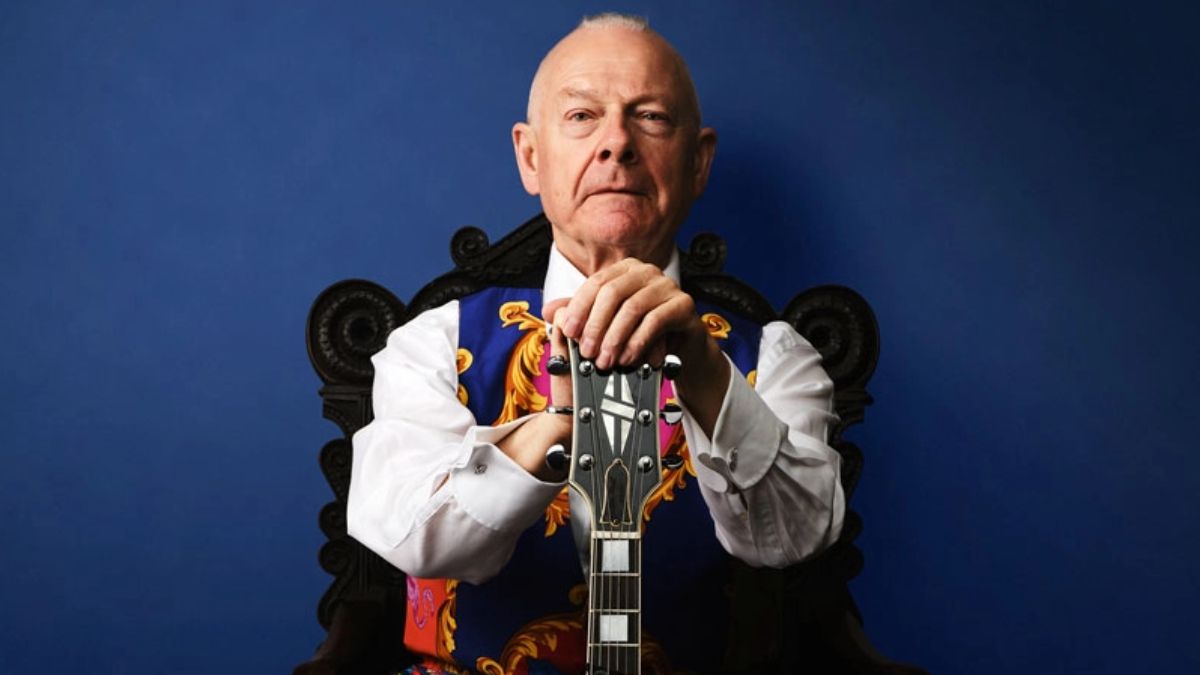Kele Okereke: "I'm making sounds I could have never made before. This record has made me think differently about myself as a guitar player"
We talk to the Bloc Party frontman about the playing and gear revelations that led to his stunning, instrumental-led solo album, The Waves Pt. 1
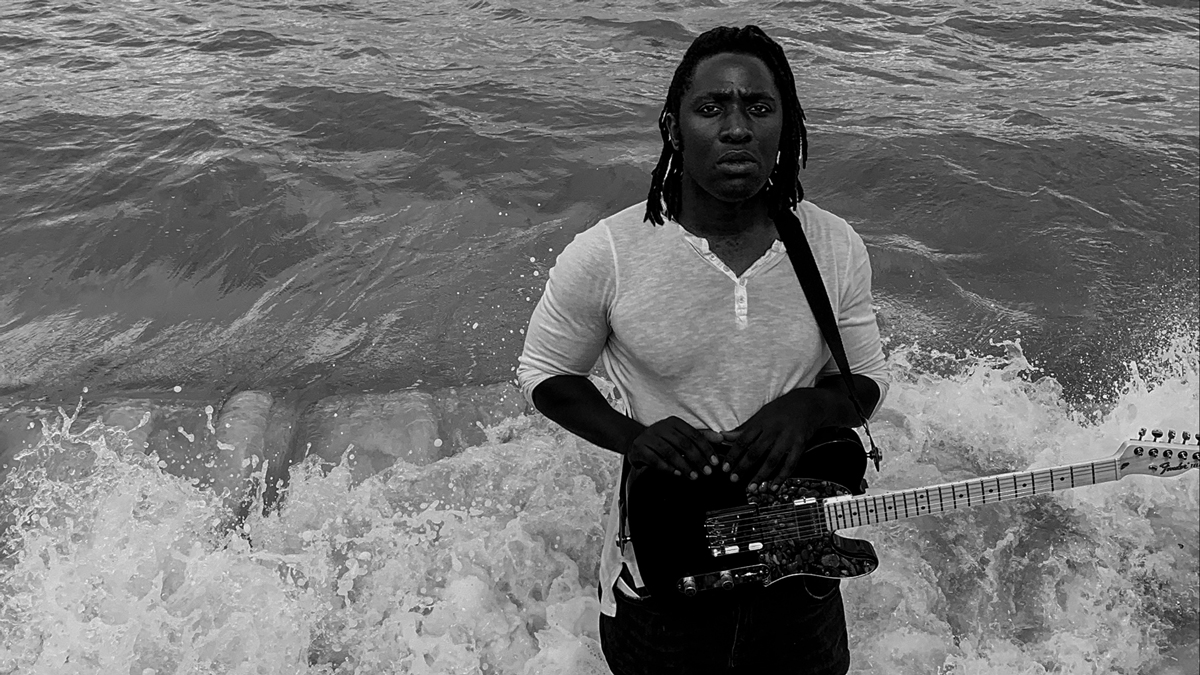
Kele Okereke, best known as the frontman of Bloc Party, has spent much of the past decade working on a huge variety of solo projects that have explored dance, electronic music production, DJ-ing and theater.
The common thread uniting his output across this time has been an examination of the personal and human impacts of the West’s surging right-wing politics. As a gay black man and child of immigrant parents who has lived in the US and UK, he has felt angry, vulnerable and exhausted. When lockdown hit, he took time off, before a series of guitar covers posted on Instagram began to inspire a new record, The Waves Pt. 1.
Half song-based, half instrumental, it’s an album that combines his experience in electronic production with the cut-glass guitar lines and intelligent arrangement that set Bloc Party apart from the landfill indie of the Noughties.
Created with a strict palette of guitar, vocals and piano, it’s calm, spacious, and yet occasionally gives way to a menacing undertow. It also contains what is quite possibly the finest cover of Bronski Beat’s Small-town Boy ever committed to record.
We spoke to Okereke about the record’s “cleansing” production process, the dual-amp setup at the heart of The Waves Pt. 1 and why he’s playing in a way he’s never played before.
How have you navigated the past year without shows? Do you still feel like a musician?
“It's definitely been a challenging time. I've been a working musician since the early Noughties, so this last year has been quite hard. I’ve had to get creative with the situation.
All the latest guitar news, interviews, lessons, reviews, deals and more, direct to your inbox!
"I joined Instagram at the start of the lockdown. I've never really used it before, but during the lockdown it provided this lifeline for me, because I've been able to share music and have immediate feedback from people.
I joined Instagram at the start of the lockdown, and it provided this lifeline for me. I've been able to share music and have immediate feedback
"I've been sharing stripped-back versions of songs that I've written with Bloc Party or by myself, or covers of other people's songs, and it has just been easy for me to have a routine and a sense of discipline about it.
"Out of that there was a burst of creativity, which my new album kind of came out of. So, yeah, I still feel like I’m a musician. It’s been hard, but I feel quite blessed, I guess, that I'm still able to do what I do in this time.”
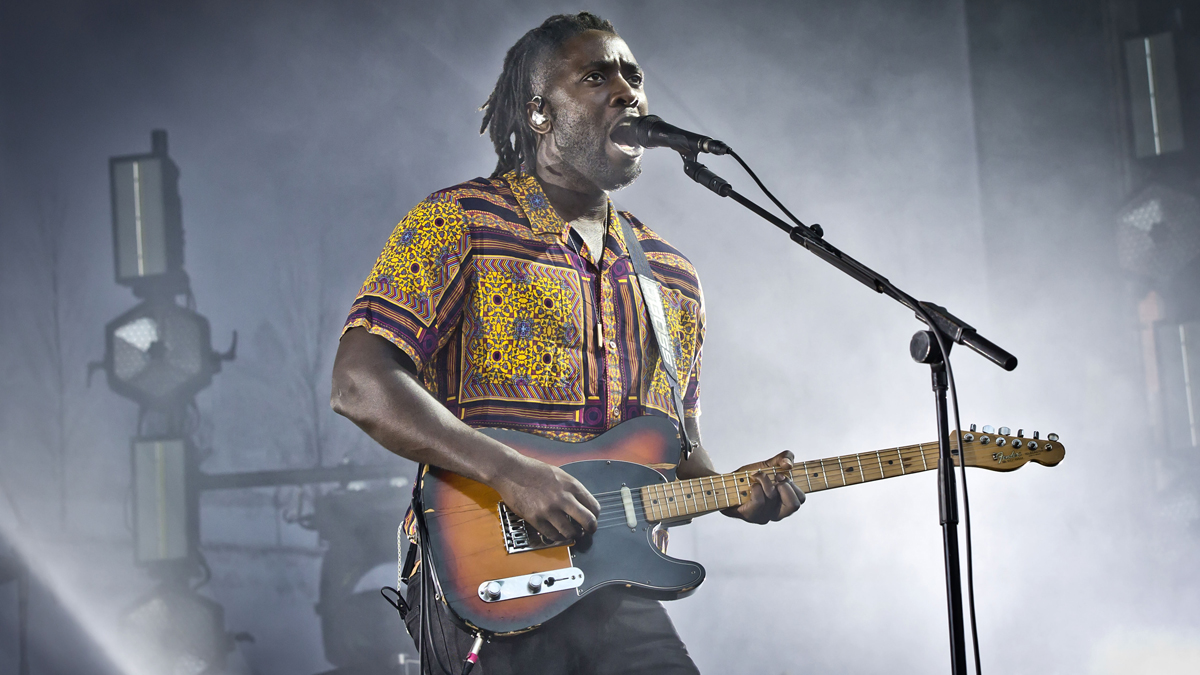
Over the past decade, your records have documented a lot of thoughts about your identity and personal feelings against the backdrop of these sizable global changes. Do you think that helped you prepare for the existential crisis of being a performer in 2020?
“Um, yeah. After making my previous solo record, 2042, I just felt that I had to switch off from what was happening in the world, because it was just too heavy. That record was an exploration of racial disparities in the UK and in the States, because we've been going through – not meaning to get too political – Trump's ascent to power and, I guess, the Brexit vote here in the UK.
For my sanity, I knew I had to step away, and that's where this new album has come from. This sense of wanting to cleanse myself from what's been going on
"It felt like those ideas of identity and race and belonging have all been up-close and personal for a very long time. So, when that record was done, I felt like I needed some space.
"Then there was the situation with the George Floyd killing at the start of the year and all of those ideas came back into came back into discussion in the mainstream.
"For me personally, for my sanity, I knew that I had to step away, and I think that's kind of where this new album, The Waves, has come from. This sense of wanting to cleanse myself from what's been going on over these last years. The initial plan was to be [entirely] instrumental, but it ended up ended up being quite song-based, about half-and-half.”
When did it become apparent to you that you were making a new solo record?
“When I finished recording 2042 there wasn't an immediate plan to make more music. We’d just had my 19-month-old, and that record came out the same week that he was born, so I didn't really do anything in terms of promoting the record. It was more about just having it out of my system, and I was resigned to the fact that I was going to be at home for the next year to be a dad.
"Then, with the lockdowns, I thought it would be the ideal time to switch off, but I realized that I couldn't switch off, really. I needed the outlet. It's something that I've had for almost half my life. It’s more than just a job for me – it's how I express myself, and it's like a type of therapy.
With my solo records, I avoid the guitar, but I started to see I was playing the guitar in a way that I'd never played before
“[I started posting these songs on Instagram]. Then, in working out these covers, I started to see I was playing the guitar in a way that I'd never really played before.
"Usually, with my solo records, I avoid playing the guitar, because it's the instrument that I use in Bloc Party. So it forces me out of my comfort zone.
"But with this record, I didn't really have any other option: I had the guitar and the pedals. I thought, ‘Now is the time to go the opposite way and make something that is solely kind of guitar textures.’ Which is fine, but then it’s like, ‘Well, how do you keep it interesting?’
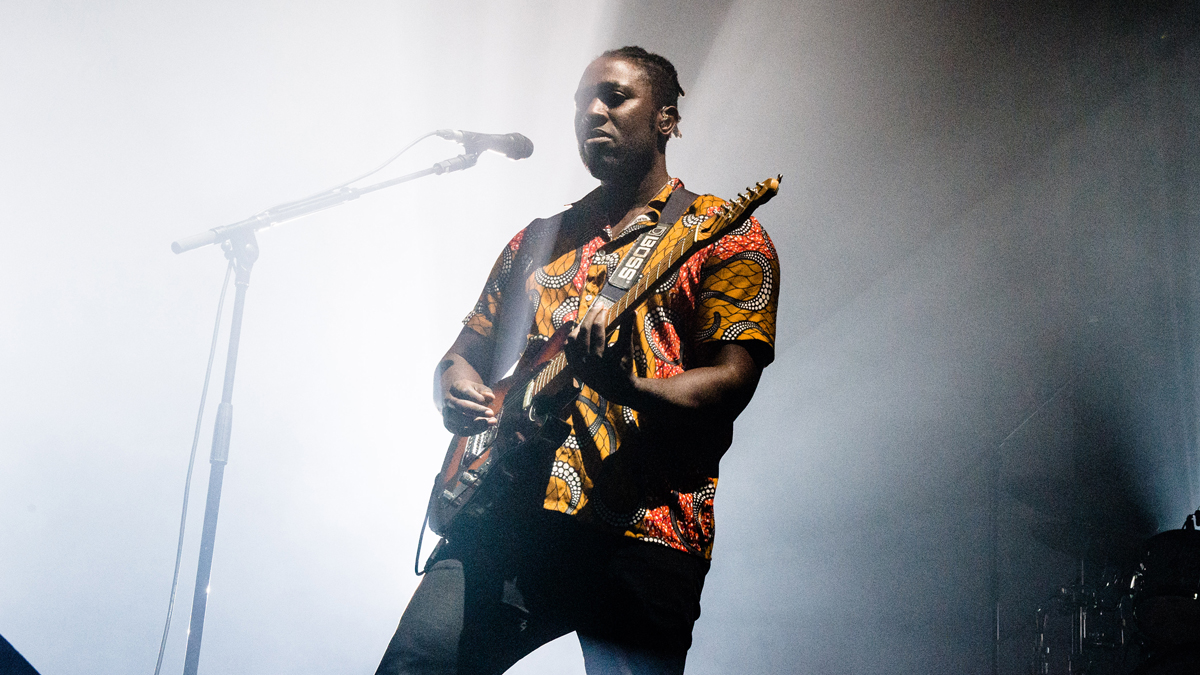
Which track was the key to unlocking that?
“The first track that made me realize that I had something was The Heart of the Wave. I was making these pulling kind of synthetic, glistening, shimmering tones, and I knew that it was something I'd never done before.
"I’ve made a lot of electronic music in the past and DJ-ed, so it was kind of fascinating for me to try and think of my guitar in the same way that a DJ would mix records together.
The Heart of the Waves showed me that I could take my playing off the fretboard and on to the pedalboard
"I was obsessed with mixing loops. In this dual-amp setup that I have at home, I got really into the idea of using the guitar to make rhythmical passages, and then kind of fading them together.
"The Heart Of The Waves showed me that I could do that – that it was possible to think differently about the guitar. That you could take your playing off the fretboard and on to the pedalboard. That was exciting for me.”
It would have been easy to add some drum samples or other instruments in here. Was it a conscious decision to avoid that?
“Yeah. Every sound on the record had to come, I felt, from a guitar or an acoustic piano. I could easily let a beat-maker program drums, but I felt it would make for a more captivating listen if I could convey movement or rhythm without putting beats on it.
"I’ve only really been listening to classical music or ambient music [throughout lockdown], so this idea of taking the drums off and making everything up-close was, I think, definitely a reaction to the music I was listening to, like Steve Reich, or Arvo Pärt.
Every sound on the record had to come from a guitar or an acoustic piano. I was looking into different places this time
"There is this American avant-garde composer called Glenn Branca who does this fantastical work with electric guitars, where he stacks dissonant guitar work on top of each other. Those were the things that were really, really inspiring me. I was looking into different places this time.”
You’ve chosen to explore making spacious guitar instrumentals at a point when the ‘noise’ in popular culture and politics feels louder than ever. Which of the instrumentals means the most to you?
“I like them for different reasons. One that I'm most proud of is probably The Patriots because of the mood that it evokes. It's only like two minutes or something, but there's such a progression and there are so many different sections, and it all kind of leads to this dizzying, noisy, open place towards the end.
"With the title, I had to give myself a break from what was happening in the world over the past year. I think that piece encapsulates the fear that I have experienced over this last year, seeing these elevated levels of nationalism in mainstream discourse.
"Just to me, as a child of immigrants, I do get a sense of fear or anxiety when people talk about the national identity. Seeing those terrorists storm Capitol Hill in the name of patriotism, it just doesn't really compute to me. I can't help but feel this sense of dread. I think that track takes me on a journey every time I listen, and I think that's probably one of the ones I'm most proud of.”
A photo posted by on
What were your main gear choices for the record? You mentioned your two-amp setup. What does that consist of?
“Yeah, it’s a Vox AC30, then the Fender is a Blues Deluxe. The AC30 has a lovely sound. They both do. It's really just because those are the only amps that are in my house, but I think it works having them play off each other.”
How were you using those two amps? What were you doing to play them off each other?
“I have two pedalboards and I split the signal. On one 'board, there's a bunch of pedals, Loop Stations, reverbs and pitch-shifters. On the other it's a similar thing, but a slightly different setup. I’m making loops with my Loop Station, but I’m not using any click or anything. It's all by ear, so it's a bit scary.
"But I'm having to listen to myself more and I'm having to play differently, which is good. Again, it reminds me of being in clubs, and mixing records together. It's always more satisfying doing it by ear and living in the mix than it is just having everything coming out of the computer perfectly in time.
"It feels like you're more in the moment. I feel quite excited to see the parallel between those two different worlds of music.”
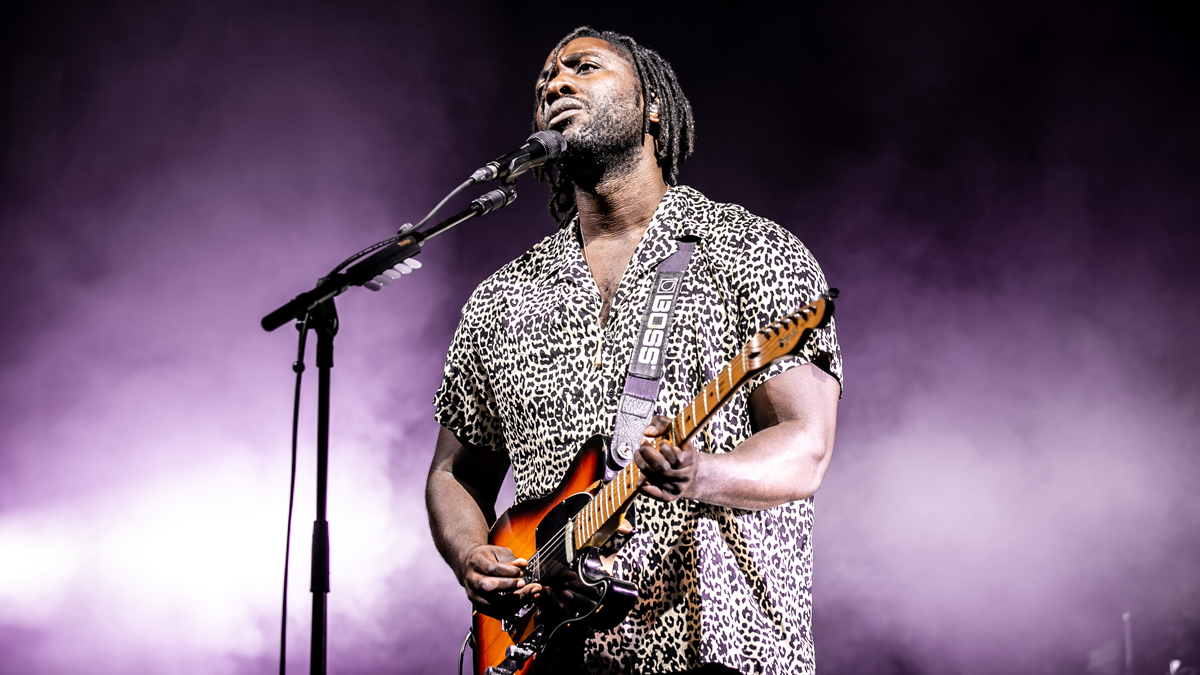
What was your main guitar on this record? Did I see a sunburst Tele?
“It’s funny, because in Bloc Party I have a sunburst Tele that I was using from the start to like two years ago, but this is a different one. I bought this Telecaster from Fender and it's an American Tele with a humbucker pickup in it, so it has it has a different kind of 'rootsier' tone.
"I've played Telecasters all my life, but I've always personally found their sound a bit brittle. As the years went on touring with Bloc Party, I would always rely on playing with the middle pickup as opposed to the treble pickup to give it a bit more body.
I've played Telecasters all my life, but I've always found their sound a bit brittle. I would always rely on playing the middle pickup to give it more body
"Then I found this Tele with the humbucker and it kind of answered my prayers because, on the one hand, I could get the bright tones, and on the other hand you can get warm, rich tones. So I love it. It's given me everything I need so far.”
What are you using to make your loops?
“One of them is the Line 6 [DL4] Delay Modeler. It has a bunch of functions and you can quite easily trigger loops that you record. That's been super-useful for me, but I think they've been discontinued. That's the only one I'm going to tell you because the other one is super-secret! [laughs] I don't want everyone rushing out and beginning to do what I do!”
It's all in the fingers, Kele! You don't need to worry about having secret pedals…
“Yeah… There's another loop pedal that I've had for ages that I've never used, but I've suddenly learned all the functions that it has on it, and it's great. I've had all these pedals for ages, but I've never really used them. I've never really had the time to sit down and explore them until now.
I'm making sounds that I could have never made before. It's really made me think differently about myself as a guitar player
"It reminds me of when I was like a kid. When I bought my first pedals, I’d go to my guitar player's house and we’d pore over what they could all do. Now, I really feel like I know what they can do, and it's been really useful in terms of rearranging the old songs and also writing new songs.
"I'm making sounds that I could have never made before and I feel super-energized. It's really made me think differently about myself as a guitar player.”
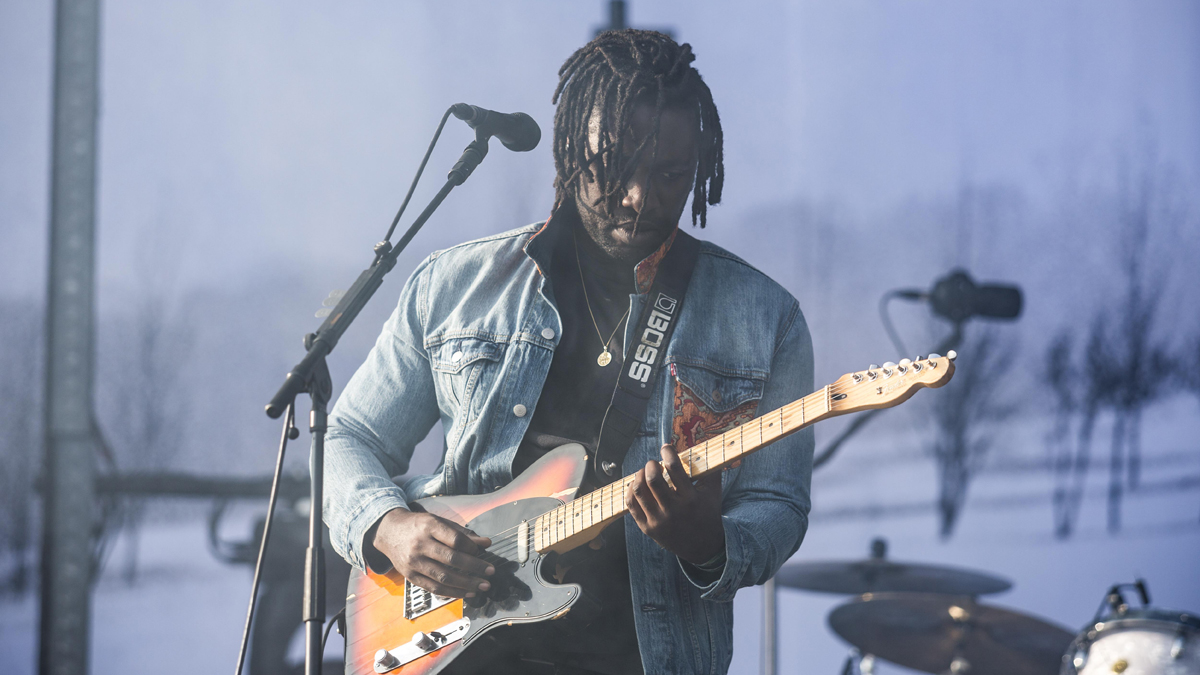
You touched on the cleansing relevance of the waves imagery before. Where did that metaphor come from? I note it's threaded through the song titles, the cover work, the video…
“And in the lyrics – there are quite a lot of references to running water. I guess, first and foremost, it comes from the reaction that I have when I'm with water. It calms me down, it connects me to the world. I'm never happier than when I'm by the water, so I think throughout my life it's been something that gives me personal joy.
Water is like a piece of music itself: if you surrender to it, it can take you somewhere else
"Then with how I was feeling in these last years, after making my last solo record and how the world was turning, I felt like I needed something that was going to cleanse me and was going to purify – and that's what water does, it heals.
"Then I think, sonically, the way the sound moves on this record, to me, it feels like it's waves rushing in and rushing out, and the movement is quite a powerful thing. Water is like a piece of music itself: if you surrender to it, it can take you somewhere else, you know?”
- The Waves Pt. 1 is out on May 28 via KOLA Records and !K7.

Matt is Deputy Editor for GuitarWorld.com. Before that he spent 10 years as a freelance music journalist, interviewing artists for the likes of Total Guitar, Guitarist, Guitar World, MusicRadar, NME.com, DJ Mag and Electronic Sound. In 2020, he launched CreativeMoney.co.uk, which aims to share the ideas that make creative lifestyles more sustainable. He plays guitar, but should not be allowed near your delay pedals.
